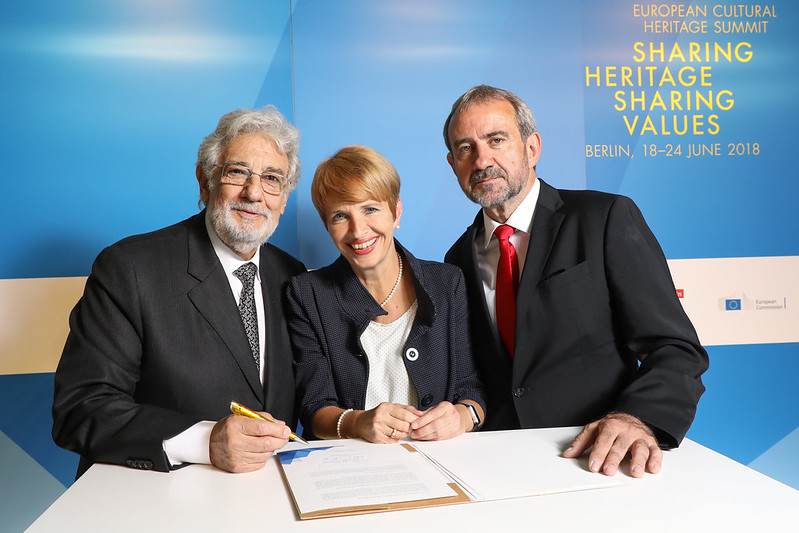Cultural Heritage for the Future of Europe: call issued at Berlin Summit
The significance of our cultural heritage, with regard to Europe’s future, is still widely underestimated. This is the strong belief of the co-hosts of the first European Cultural Heritage Summit and the reason that today, during the high-level European Policy Debate “Sharing Heritage – Sharing Values”, they jointly presented the “Berlin Call to Action”. Among the participants and speakers were various cultural heritage stakeholders and high-level decision makers, such as Tibor Navracsics, European Commissioner for Education, Culture, Youth and Sports, Karl-Heinz Lambertz, President of the European Committee of the Regions, Luca Jahier, President of the European Economic and Social Committee, and Françoise Nyssen, Minister of Culture, France.
The Berlin Call to Action is a significant contribution to the “New European Agenda for Culture” and the “Action Plan for Cultural Heritage” currently being prepared by the European Commission. It calls for the better use of the potential of Europe’s rich and diverse cultural heritage. In order to promote a stronger feeling of togetherness, the common European project should be focused on more than just economic, financial and security policies.
In view of the upcoming European Parliament elections in 2019 and the subsequent appointment of a new college of European Commissioners, the signatories of the Berlin Call are convinced that cultural heritage and its contribution to creating a sense of identity should play a much stronger role in the political debate. Adopting a tangible action plan for promoting cultural heritage should now be the common goal. This includes communicating cultural heritage, especially towards a younger audience, as well as pooling knowledge and professional expertise more consistently at both state level and among civil society.
Tibor Navracsics, European Commissioner for Education, Culture, Youth and Sports, says: “The European Year of Cultural Heritage aims to place culture and cultural heritage at the centre of our daily lives, to make it widely accessible so everyone will be able to enjoy it. This will give us the fresh impetus that we need to ensure that culture and cultural heritage keep the political attention and the funding it deserves. Just last month I presented my proposal for a New European Agenda for Culture.
My goal: Use culture’s propulsive force for the benefit of economic and social development. Of course, great ambitions need sufficient funding. I am very proud the European Commission has proposed to strengthen the EU programme for the cultural and creative sector „Creative Europe“ in the financing period after 2020 and increase its budget to 1.85 billion Euros. I am counting on Germany’s strong support for this proposal in the upcoming negotiations.”
Martina Münch, Minister for Science, Research and Culture of the State of Brandenburg and President of the German Cultural Heritage Committee (DNK), states: “Our common cultural heritage in its richness and diversity illustrates European connections across borders and across centuries. The preservation and communication of cultural heritage is an important basis for European integration and leverages the European message. The Berlin Call to Action defines specific fields of action. Cultural heritage should – in the light of the realignment of the EU cultural policy – be more widely understood as an asset, whose potential is far from being fully exploited in the fields of economy, culture, the environment and education. In the future there has to be a permanent cultural heritage platform, to further promote the exchange of ideas and between institutions beyond the European Year of Cultural Heritage.”
Hermann Parzinger, President of the Prussian Cultural Heritage Foundation (SPK) and Executive President of Europa Nostra: “Now more than ever, we want to draw attention to the European dimension of our cultural heritage. Europe is much more than a mere partnership of convenience. I am deeply convinced that cultural heritage can contribute tremendously to strengthening our self-conception as Europeans. Many buildings, monu- ments, pieces of art as well as everyday objects tell a European story, thus making us aware of our common roots. Thanks to the European Cul- tural Heritage Summit, it has become evident that European institutions, including the European Commission, have recognised the strategic signif- icance of culture for Europe’s further development. The proposal for the new financial programme confirms this. It is an investment into the future of Europe!”
The most important day of the Summit closed with the European Heritage Awards Ceremony in the presence of the Federal President of Germany Frank-Walter Steinmeier. European Commissioner Tibor Navracsics and Maestro Plácido Domingo, President of Europa Nostra, will co-host the event and announce the 7 Grand Prix winners of the EU Prize for Cultural Heritage / Europa Nostra Awards 2018.
The European Cultural Heritage Summit, with its motto “Sharing Herit- age – Sharing Values”, is the largest European event taking place during the European Year of Cultural Heritage 2018. The Summit – supported by the European Commission, the German Federal Government Commis- sioner for Culture and the Media as well as the Berlin Senate Department for Cultural Affairs and Europe – is co-hosted by the German Cultural Heritage Committee (DNK), the Prussian Cultural Heritage Foundation (SPK) and Europa Nostra, the leading European heritage network.
The Berlin Call of Action is available for download here.







